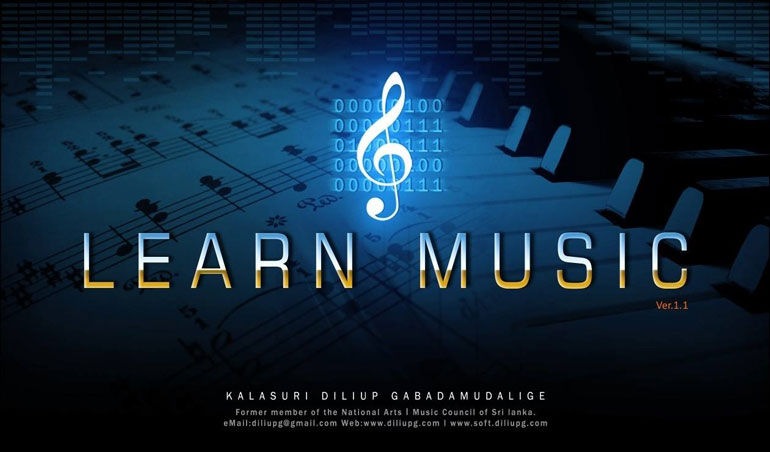Friday Feb 20, 2026
Friday Feb 20, 2026
Saturday, 12 September 2015 00:00 - - {{hitsCtrl.values.hits}}

Opening screen of the software
The art of music is definitely a topic that ignites conversations amongst all of us, be it at place of education or a night out with family and friends. What sounds good to the ear makes us marvel at its power and ability to inspire.
However, the ability to appreciate and understand what we hear, as well as learning to be the creator of your own musical compositions require us to start off as a beginner regardless of how young or old you are. No matter the instrument you are passionate to start learning, be it the piano, cello, saxophone, guitar, etc. doing it right will entail having to understand the theoretical make-up behind it.
In making this endeavour much easier and interesting to everyone who is a music enthusiast, our very own Kala Suri Diliup  Gabadamudalige has created the Learn Music software, which combines his love and passion for coding/software with music. This software is first of its kind in Sri Lanka and has several impressive features, which makes it a very useful tool.
Gabadamudalige has created the Learn Music software, which combines his love and passion for coding/software with music. This software is first of its kind in Sri Lanka and has several impressive features, which makes it a very useful tool.
Diliup is a multi-instrumentalist, composer, lyricist and producer and renowned for his pioneering contributions to MIDI music in Sri Lanka.
Playing an instrument and performing is more often than not, a much bigger commitment than first anticipated. Diliup explains to us that in order to learn to play the piano or any other instrument for that matter, one needs to first and foremost, seek a music teacher who possesses sound knowledge in teaching a student all aspects technical and otherwise, that differentiate simply hitting a note with what and how to play music. Similarly, in order to make it all come together, a dedicated student needs to ‘practice, practice, practice!’ in order to perfect fine and tune his or her skills.
Diliup’s idea behind this software is to aid beginners and those who are unfamiliar with how to read music, about a range of fundamentals which will enable one to comprehend music better. It will also prove to be a guide and a starting point for the hordes of adults who have postponed and excused themselves from learning music as they are now too old for it or ‘always wanted to but never found the time’ or simply ‘never got around to it’.
The software covers a variety of topics which are quintessential to a beginner in learning the ABCs of theory in music. For instance, it takes you through the workings behind different types of notes, rhythms, dynamics, articulation, etc. that any piece of music is made up of, so that you can eventually learn to decipher slowly but surely, the different types of music we hear around us every day.
One of the main advantages of this software is that, with the savvy use of programming/ IT and the wonderful concept of probability, it generates random quizzes each time as you complete a particular topic of study. Hence as opposed to a printed book, you can complete the quizzes as many times you like and any wrong answers corrected at the end of the quiz. This form of exercise is bound to familiarise and support a thorough understanding of different theoretical aspects.
Music students will also benefit by way of a more interesting and enjoyable method to complete exercises. The content also reads snippets of information that are conventionally rare to come by or not mentioned in the more popular publications. As such, it may add value even to those of you who are quite familiar with music already.
An additional tool that complements Learn Music, also programmed by Diliup is ‘Easy Scales and Chords’. This software helps you find the notes of any given scale instantaneously.
It is an extremely useful tool to retrieve a given scale quickly. This is incorporated into the Learn Music software in a much greater scope, where students are able to learn how to identify scales, arpeggios and all the different chords that you can come across. This facet of the software has proven extremely useful especially to advanced students who would like to retrieve any given chord in any given key signature.
Let’s assume that you are to face a music exam in the near future. Maybe you simply want to write your own song or test how good your ear is. You are not only able to identify the notation of each chord, scale and arpeggio, but you are in fact able to hear what each of these sound like. This is an excellent way to sharpen one’s aural skills because this is the essence of sound and consequently, music. You are also able to use the virtual keyboard provided to play around with your own blank canvas. It could be said that this aspect of practicality brought into this software lends a helping hand to not just students, but to a much wider audience.
It goes without saying that developing and selling software entails its own share of expertise and hard work, which through the years have brought about software piracy acts, copyright law, etc. and exorbitant prices to pay for in exchange for these software.
Learn Music, which is entirely written on Python (programming language) is freeware, distributed absolutely free of charge and available to everyone! Essentially all you must do to start leaning music is to download the software through Diliup’s software page: www.soft.diliupg.com. The software is extremely easy to set up, as the time taken to download and start using it takes under a couple of minutes. The interface of the software is user friendly and easy to navigate through.
Diliup would also love to hear from you regarding your experience with the software, as feedback will foster improvement and resolve any other issues that you as a user may encounter at any point. So share your thoughts with him on [email protected]. It is hoped that you make use of this generous compilation by downloading, sharing and enjoy the learning!
Music is a universal language, the roots of which stay true to the great classical masterpieces by Mozart or Beethoven to the pop songs of today. Sharpening skills and knowledge to appreciate and practice music more objectively as a student of music or simply an enthusiast, and with meaning would be truly rewarding.